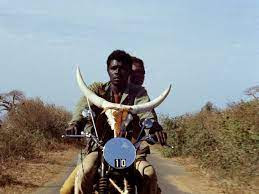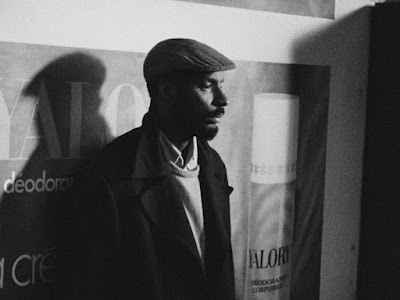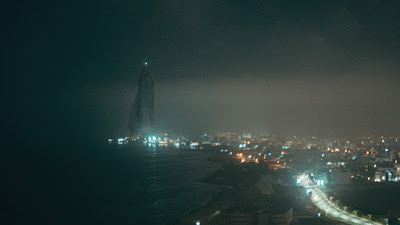My previous comments about the broken film distribution model still stands for 2024. What I didn’t expect was that this broken distribution model and its needlessly delayed timeline of seeing films 1-1.5 years after their Cannes debut would impact my perception of a film. This is because the world was in different place in May 2024 (Cannes) compared to the first few months of 2025, which is when I saw a handful of the award-winning Cannes 2024 titles. Films such as Anora (Palme D’or), All We Imagine as Light (Grand Prix), Emilia Pérez (Jury Prize), The Seed of the Sacred Fig (Prix Special) paled in comparison to the chaotic drama that the world was thrown into. Perhaps, the warm weather at Cannes played a part in the glowing reception of these films but in the harsh reality of the cruel world, these films shrunk in stature. I like to think this isn’t a purely subjective take. Films such as Universal Language, Grand Tour and Misericordia also debuted at Cannes yet their artistic merit shone through. I may be picking on a few Cannes titles but this view also applied to other award winning festival films (Berlin, Sundance) so much so that for the first time in more than two decades, I cannot put together a list of 10 films.
My year-end list will only consist of
7 titles with 3 of those films being documentaries and 3 others that borrow
heavily from documentaries. Three Documentaries in my end-of-the-year list is
also another rare occurrence but all three films are timely. There are still a
few 2024 films that I am waiting to see so perhaps by the end of 2025, I may be
able to finally have a proper 10.
Best Films of 2024
1. No Other Land (Palestine co-production,
Yuval Abraham/Basel Adra/Hamdan Ballal/Rachel Szor)
Easily the most relevant film of
2024! It is amazing that this film exists at all. This isn’t the first time
theft of Palestinian land is shown on camera. Pomegranates and Myrrh
(2008) showed how the Israeli army uses a pretext of security to annex a Palestinian
family’s home. That 2008 fictional film, albeit based on real-life scenarios, was
ignored. No Other Land shows this very topic in a documentary
format and it has gotten some attention. The Academy Award for Best Documentary
also helped gain distribution but people will see the film and nothing will
change. In fact, the land grab and stealing has been increasing after this film
came out. At least, this film documents what happens and in the future, it will
be evidence that the world did nothing and watched it all happen.
2. Santosh (UK/Germany/India/France, Sandhya
Suri)
The core topic of the film isn’t new
as many films have depicted how corruption and abuse of power allows crimes against
girls/women to go unchecked. Yet, since this isn’t an Indian production, it
lends an outsider observational perspective that is focused on tiny details often
neglected by Indian films. Director Sandhya Suri’s previous work on
documentaries is also another reason those details help in giving this film a
realistic feel. In addition, there is a new angle to observe the events from
women. The film is shown from the perspective of a female police officer who is
wearing the uniform but who is still a civilian at heart, due to how she got
the job in the first place. That allows her to straddle the line between the two
worlds while still maintaining her humanity.
The two performances by Shahana Goswami
and Sunita Rajwar are top-notch.
3. Soundtrack for a Coup D’état
(Belgium/France/Holland, Johan Grimonprez)
Another film that takes a topic covered
before but adds a new entry point which allows things to be considered in a new
light. The assassination of Patrice Lumumba has been shown on film before but
the association with jazz music and the incorporation of Khrushchev’s words
give plenty of food for thought. This film will always be relevant because the
cycle of events that this assassination started is still impacting our world.
4. Dahomey (France/Senegal/Benin/Singapore, Mati Diop)
The film focuses on the specific
return of 26 artifacts to Benin but opens up what should be a universal debate
about the fate of looted property across Latin America, Africa and Asia. Highly
relevant and essential viewing.
5. Grand Tour (Portugal/Italy/France/Germany/Japan/China,
Miguel Gomes)
The film lives
up to the title yet being playful. A woman is abandoned by her fiancée who runs
away yet she doesn’t give up. She follows him around the world, picking up on clues.
A leisurely chase.
6. Misericordia (France/Spain/Portugal, Alain
Guiraudie)
One of the
most creative murder investigation films that plays with genre and
expectations. There is a very subtle deadpan layer to the film which becomes
apparent once the strangeness of the scenarios increases.
7. Universal Language (Canada, Matthew
Rankin)
Matthew
Rankin showed his creative talent with The 20th Century.
This time he raises the creativity bar a few more notches with a reimagined
version of Canada where Farsi-French are the two official languages and people
confuse Manitoba with Alberta (entirely believable from a Toronto perspective).









